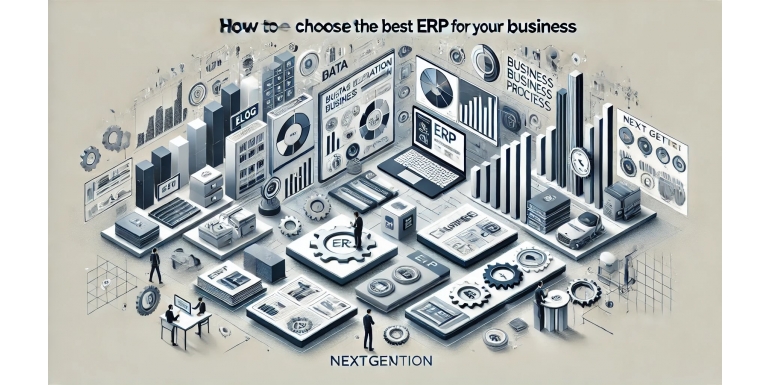
How to Choose the Best ERP for Your Business ?
Choosing the best ERP (Enterprise Resource Planning) for your business is a crucial decision that can determine the efficiency of your operations and your long-term success. With so many options available on the market, it's essential to understand your needs and evaluate ERP solutions rigorously. This article will guide you through the essential steps to choose the ideal ERP for your business, addressing the key criteria to consider.
1. Understand Your Specific Needs
The first step in choosing an ERP is to thoroughly understand the specific needs of your business. Every company is unique, and the features required for a manufacturing company may be very different from those needed for a service-oriented business or retail. Ask yourself the following questions:
- What are the main functions that the ERP must cover? (Accounting, inventory management, human resources, etc.)
- What are the current processes that need improvement or automation?
- What is the size of your business, and what are your growth prospects?
- Do you need an ERP solution specific to your industry?
2. Evaluate Available ERP Options
There are several types of ERP on the market, each offering different features and benefits. The main types of ERP include:
- On-Premise ERP: Installed locally on the company’s servers, this type of ERP offers full control but requires a robust IT infrastructure.
- Cloud ERP: Hosted on remote servers and accessible via the internet, this type of ERP offers greater flexibility and reduced initial costs.
- Open-Source ERP: A flexible and customizable solution, often less expensive but requiring technical expertise for implementation and maintenance.
- Industry-Specific ERP: Designed to meet the specific needs of particular industries, such as manufacturing, distribution, or healthcare.
3. Consider Scalability and Growth
It’s crucial to choose an ERP that can grow with your business. Your needs today may be different in a few years, especially if you anticipate rapid growth. Ensure that the ERP you select can:
- Handle an increase in the number of users.
- Integrate new features or modules.
- Adapt to geographical expansion or internationalization.
4. Analyze Total Costs
Cost is a major factor in choosing an ERP. However, it’s important to consider not just the initial cost, but also long-term expenses:
- Acquisition Cost: Includes licenses, installation fees, and integration costs.
- Maintenance Cost: Includes updates, technical support, and service fees.
- Training Cost: Includes training employees to use the new ERP.
- Customization Cost: If you need a highly customized solution, this can increase costs.
5. Check Integration with Existing Systems
A good ERP should integrate seamlessly with your company’s existing systems, such as accounting software, CRM tools, and supply chain management solutions. Smooth integration allows you to:
- Avoid redundancies and data errors.
- Facilitate the migration of historical data.
- Optimize workflows between different departments.
6. Examine Ease of Use
The user interface and ease of use are often overlooked but essential aspects to ensure the adoption of ERP by employees. A difficult-to-use ERP can lead to resistance to change and decreased productivity. When evaluating, consider:
- The simplicity of the user interface.
- The availability of online tutorials and training.
- The ability to customize dashboards for different users.
7. Consult Reviews and Case Studies
Before making a decision, it’s helpful to consult reviews from other businesses that have used the same ERP. Look for case studies in your industry to understand how the ERP was implemented, the challenges faced, and the results achieved. Ask yourself:
- What feedback do users provide regarding reliability and customer support?
- Has the ERP improved operational efficiency and profitability?
- What were the main difficulties encountered during implementation?
8. Test the Software with a Demo or Free Trial
Most ERP providers offer demos or free trials. Take advantage of these to test the key features of the ERP and see how it fits your business's specific needs. During the trial, ensure you:
- Test essential business processes within the ERP.
- Evaluate the software's performance in real-world conditions.
- Involve end-users in the testing process to gather their feedback.
9. Assess Vendor Support and Services
Technical support and assistance services from the ERP vendor are essential to ensure successful implementation and continuous use without issues. Make sure the vendor offers:
- 24/7 technical support.
- Training services for new users.
- A regular update plan to incorporate new features and maintain security.
10. Consider Security and Compliance Aspects
With the growth of cyber threats, data security is paramount. Choose an ERP that integrates robust security measures, such as data encryption, role-based access controls, and regular backups. Additionally, ensure the ERP complies with local and international regulations, such as GDPR in Europe.
Conclusion
Choosing the best ERP for your business is a complex process that requires thorough analysis of your needs, rigorous evaluation of available options, and careful planning. A well-chosen ERP can transform the way your business operates, improving efficiency, reducing costs, and enhancing competitiveness. Take the time to explore different solutions, consult user reviews, and test the software before making a decision. With the right ERP, your business will be better equipped to face future challenges and thrive in an ever-changing business environment.
